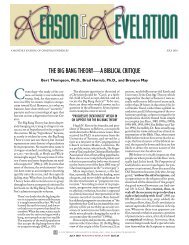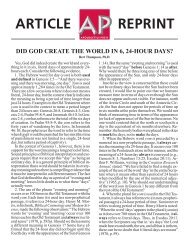The Many Faces, and Causes, of Unbelief - Apologetics Press
The Many Faces, and Causes, of Unbelief - Apologetics Press
The Many Faces, and Causes, of Unbelief - Apologetics Press
You also want an ePaper? Increase the reach of your titles
YUMPU automatically turns print PDFs into web optimized ePapers that Google loves.
was present. So pr<strong>of</strong>ound was his grief <strong>and</strong> disappointment<br />
at the failure <strong>of</strong> God to cure him overnight that from that point<br />
forward he pledged never to believe in God again.<br />
In the mid-1960s, a devoutly religious young man from<br />
Chattanooga, Tennessee, was a role model for all <strong>of</strong> his classmates.<br />
He led a prayer group, <strong>and</strong> planned to become a foreign<br />
missionary—until his sister died <strong>of</strong> leukemia <strong>and</strong> his father<br />
committed suicide. <strong>The</strong> boy’s belief in God collapsed,<br />
<strong>and</strong> he subsequently became one <strong>of</strong> America’s most outspoken<br />
unbelievers, humanists, <strong>and</strong> pro-abortion advocates. That<br />
boy’s name?—Ted Turner, founder <strong>of</strong> world-famous CNN, the<br />
Turner Broadcasting System, <strong>and</strong> other well-known media<br />
enterprises.<br />
But, <strong>of</strong> course, it is not just the famous who ab<strong>and</strong>on their<br />
belief in God because <strong>of</strong> evil, pain, <strong>and</strong> suffering in their lives.<br />
<strong>The</strong> “man (or woman, as the case may be) on the street” is no<br />
less affected. A case in point is that <strong>of</strong> Judith Hayes, a senior<br />
writer for <strong>The</strong> American Rationalist. In 1996, Mrs. Hayes<br />
authored an acrimonious tirade titled, In God We Trust: But<br />
Which One?, in which she explained why she left the Lutheran<br />
Church (Missouri Synod) <strong>and</strong> became an atheist. First, as a<br />
youngster she had a good friend named Susan who was a devout<br />
Buddhist. Judith, however, simply could not accept the<br />
teachings <strong>of</strong> Scripture that Susan would be lost if she did not<br />
obey the biblical scheme <strong>of</strong> redemption set forth so plainly in<br />
God’s Word. Thus she made, not a rational decision based<br />
upon the evidence, but an emotional decision based on her<br />
own “inner desires.” Neither Christianity, she said, nor its<br />
God, could be accepted as true.<br />
Second, Judith eventually married. But the relationship<br />
soured <strong>and</strong> disintegrated due to the fact, Mrs. Hayes reported,<br />
that her husb<strong>and</strong> became verbally abusive. Instead <strong>of</strong> considering<br />
the possibility that she had made a poor choice <strong>of</strong><br />
mates, or that her husb<strong>and</strong> had misused his own personal<br />
freedom <strong>of</strong> choice, Judith blamed God. “[H]ow could I possibly<br />
have wound up married to a tyrant?,” she wrote. “Why<br />
had God forsaken me?” (1996, p. 15).<br />
-99

















